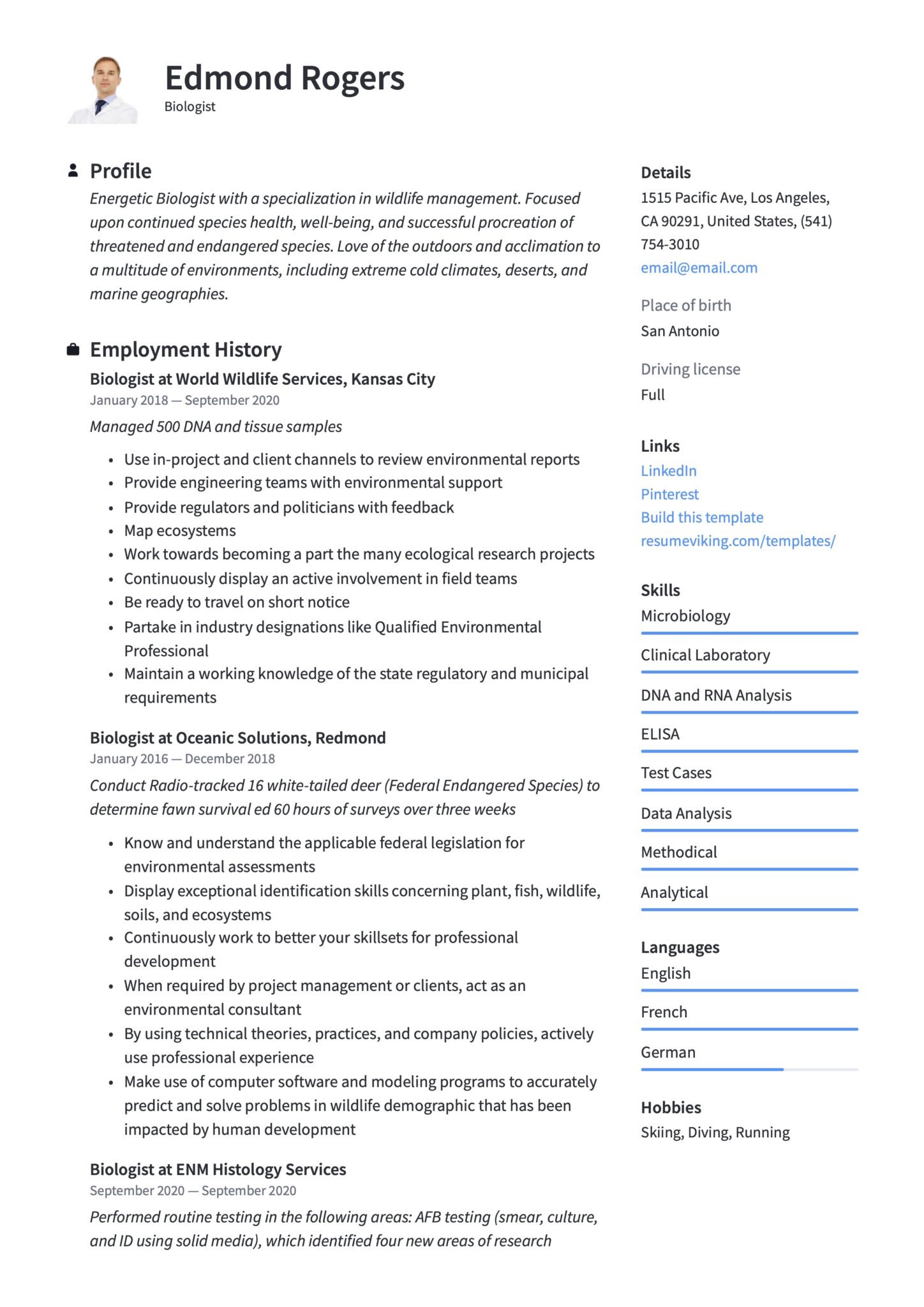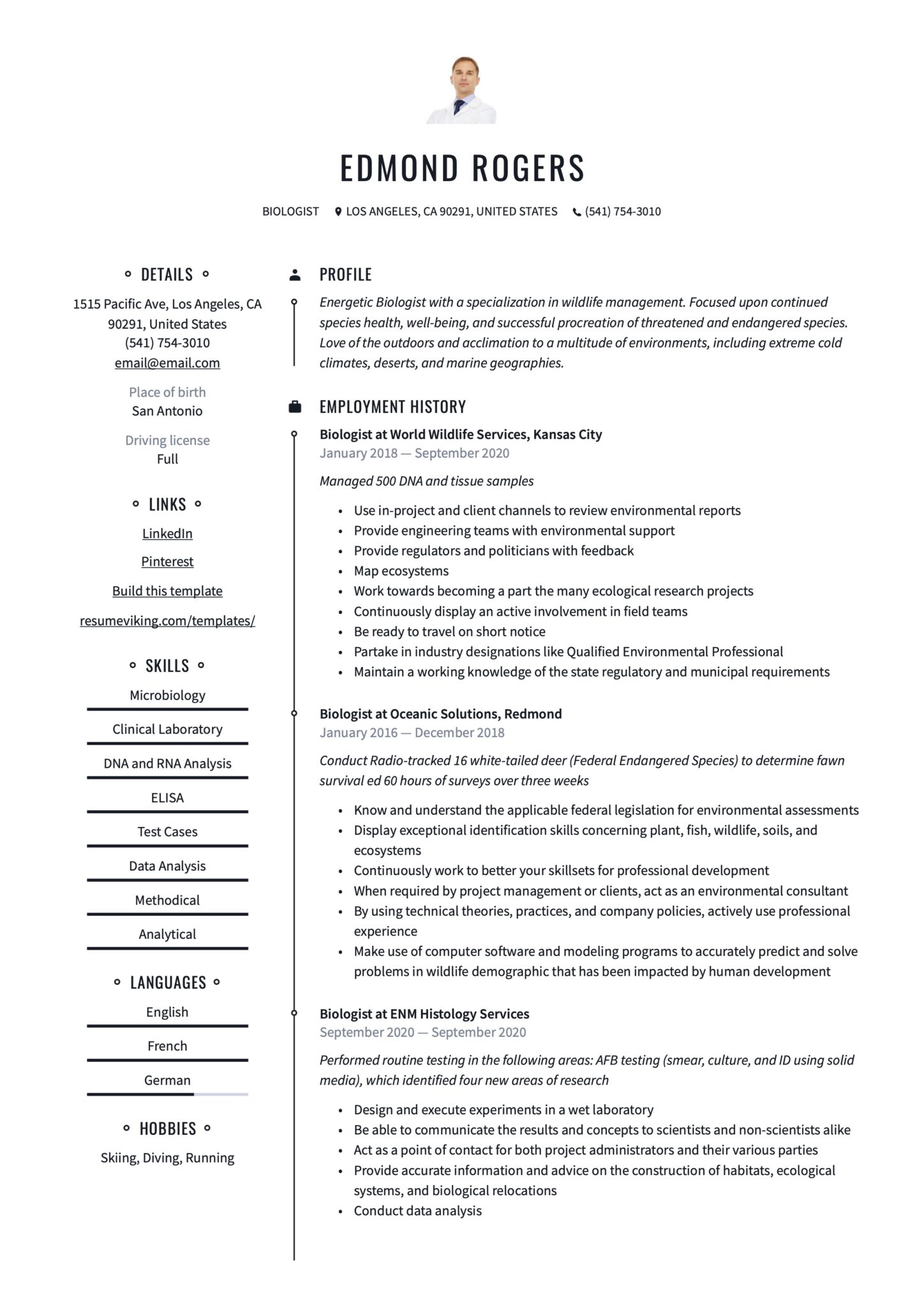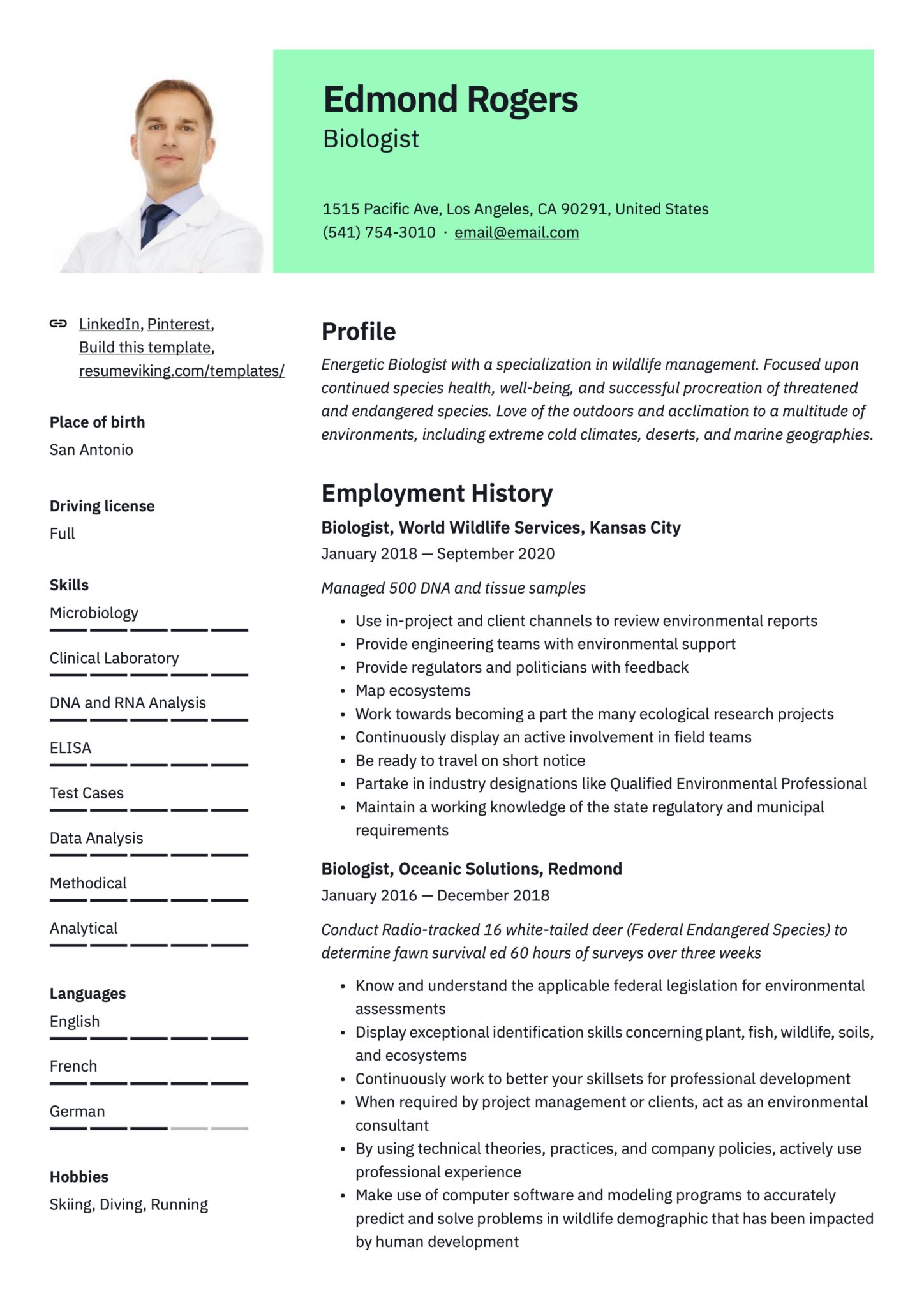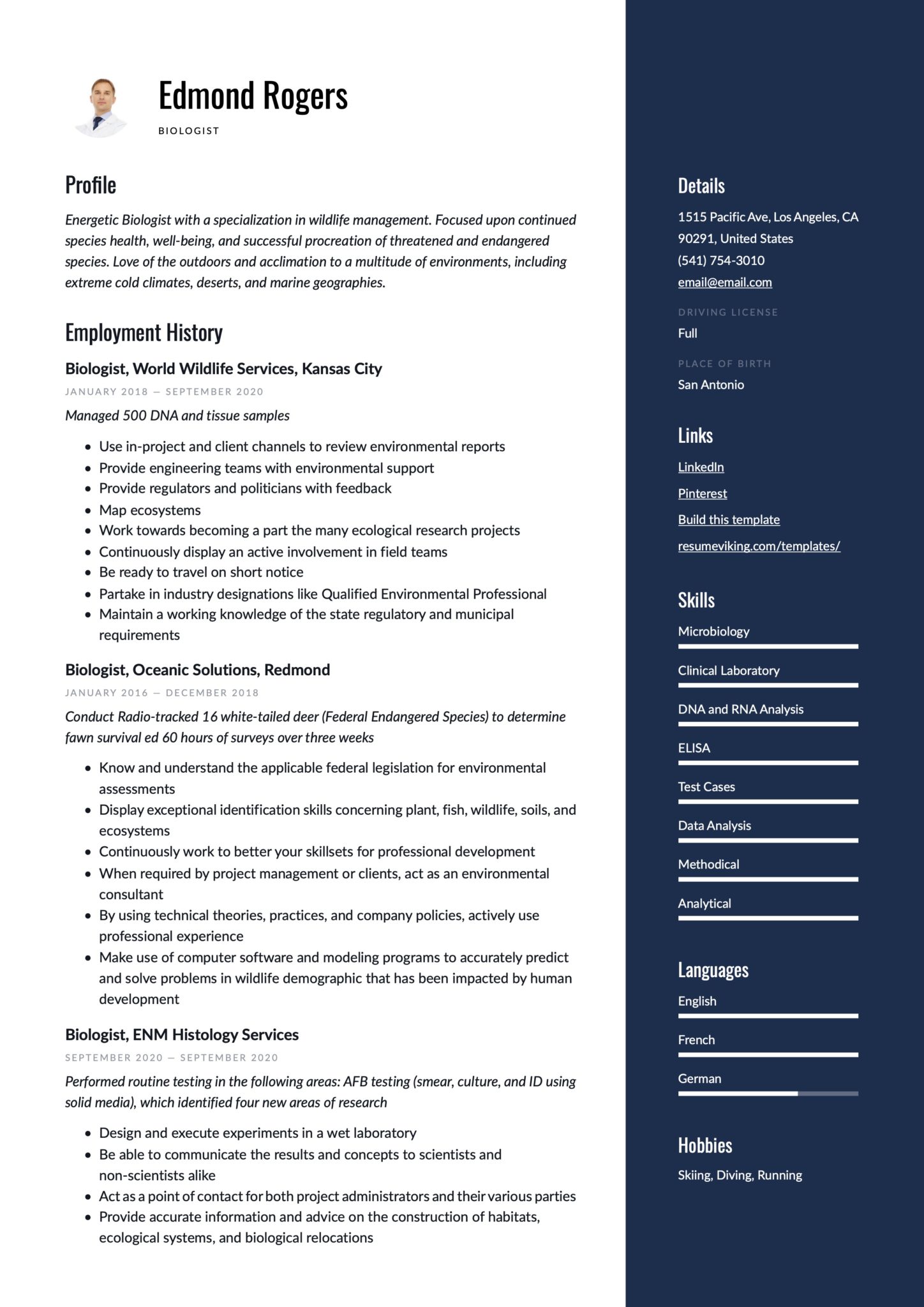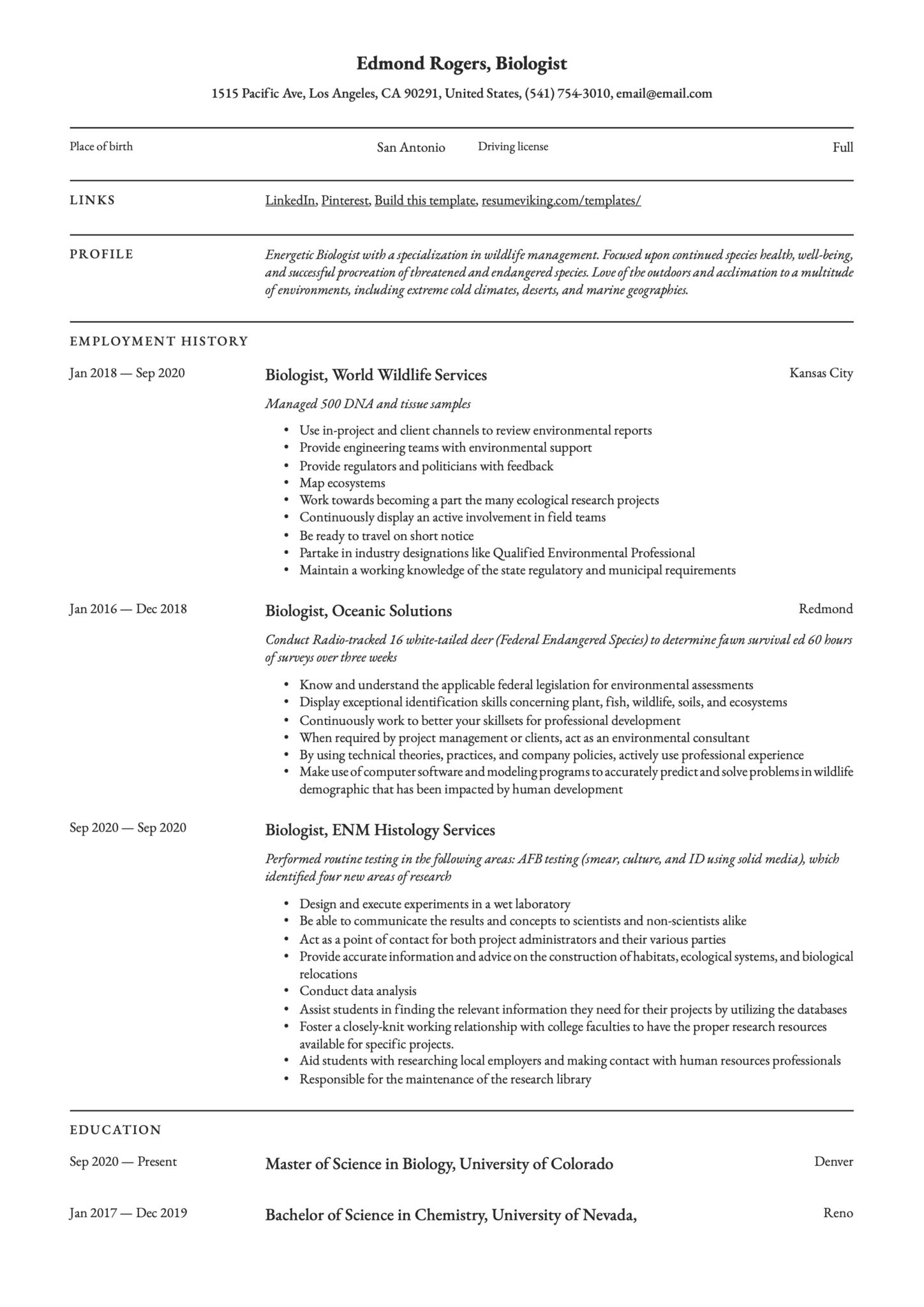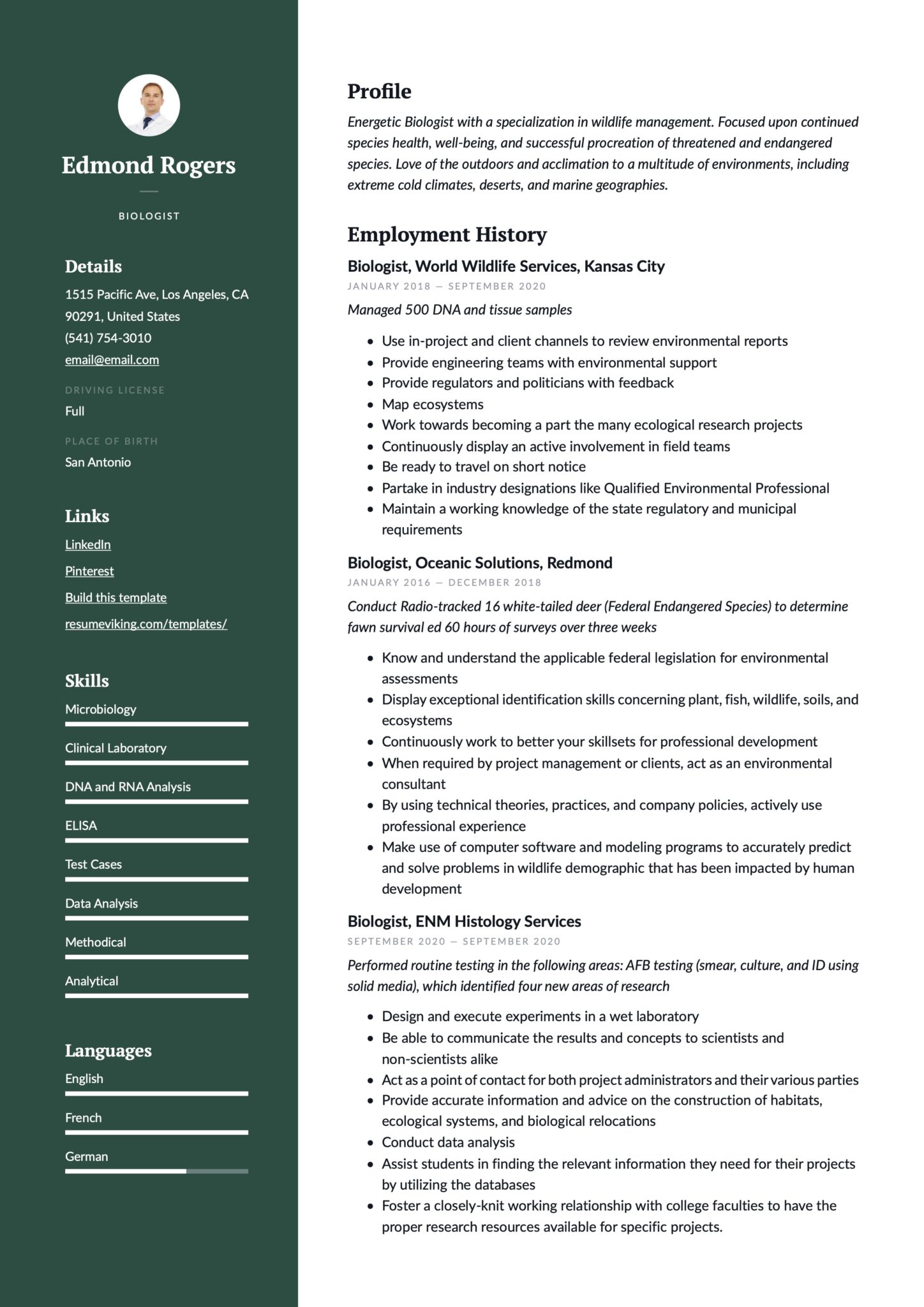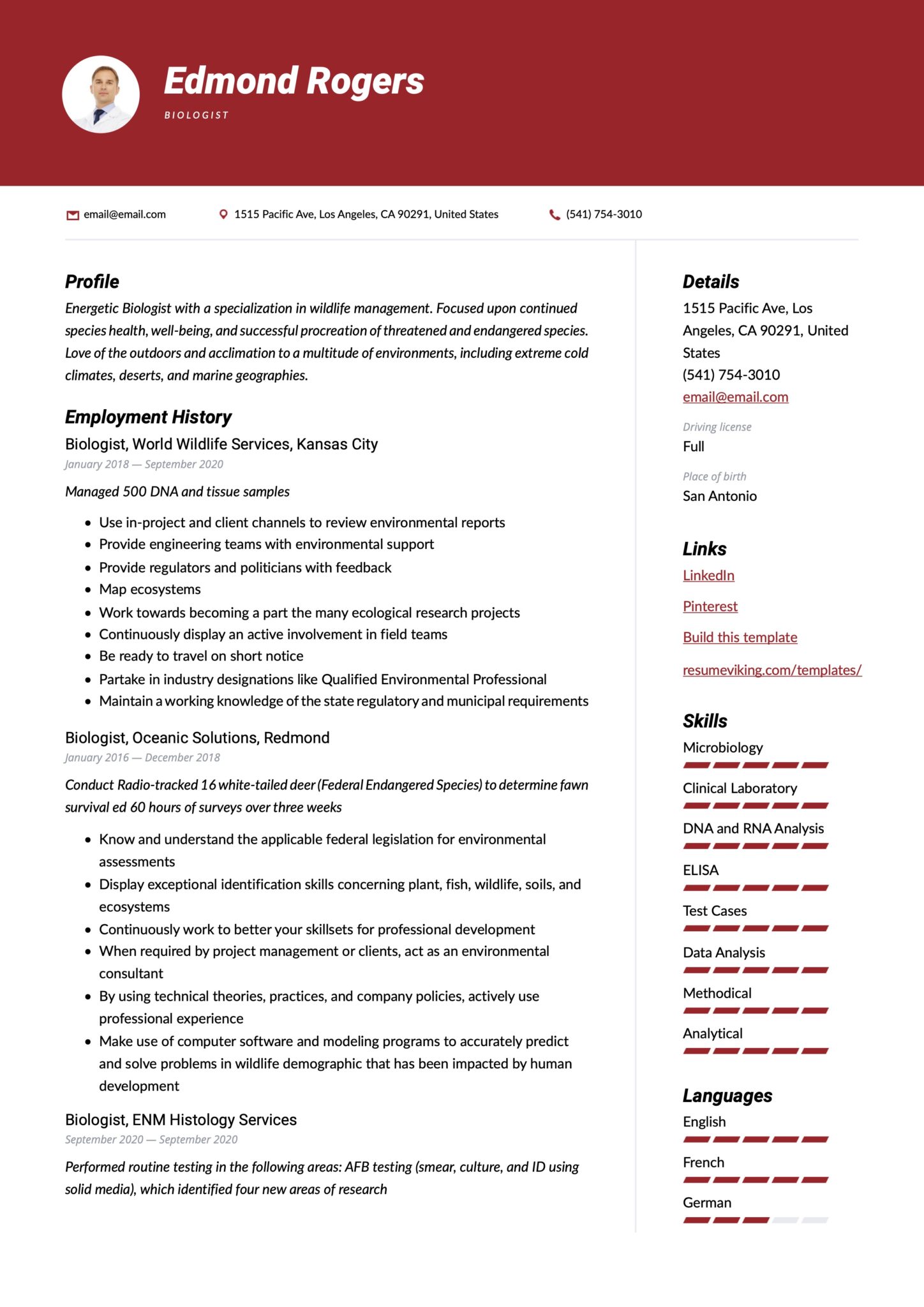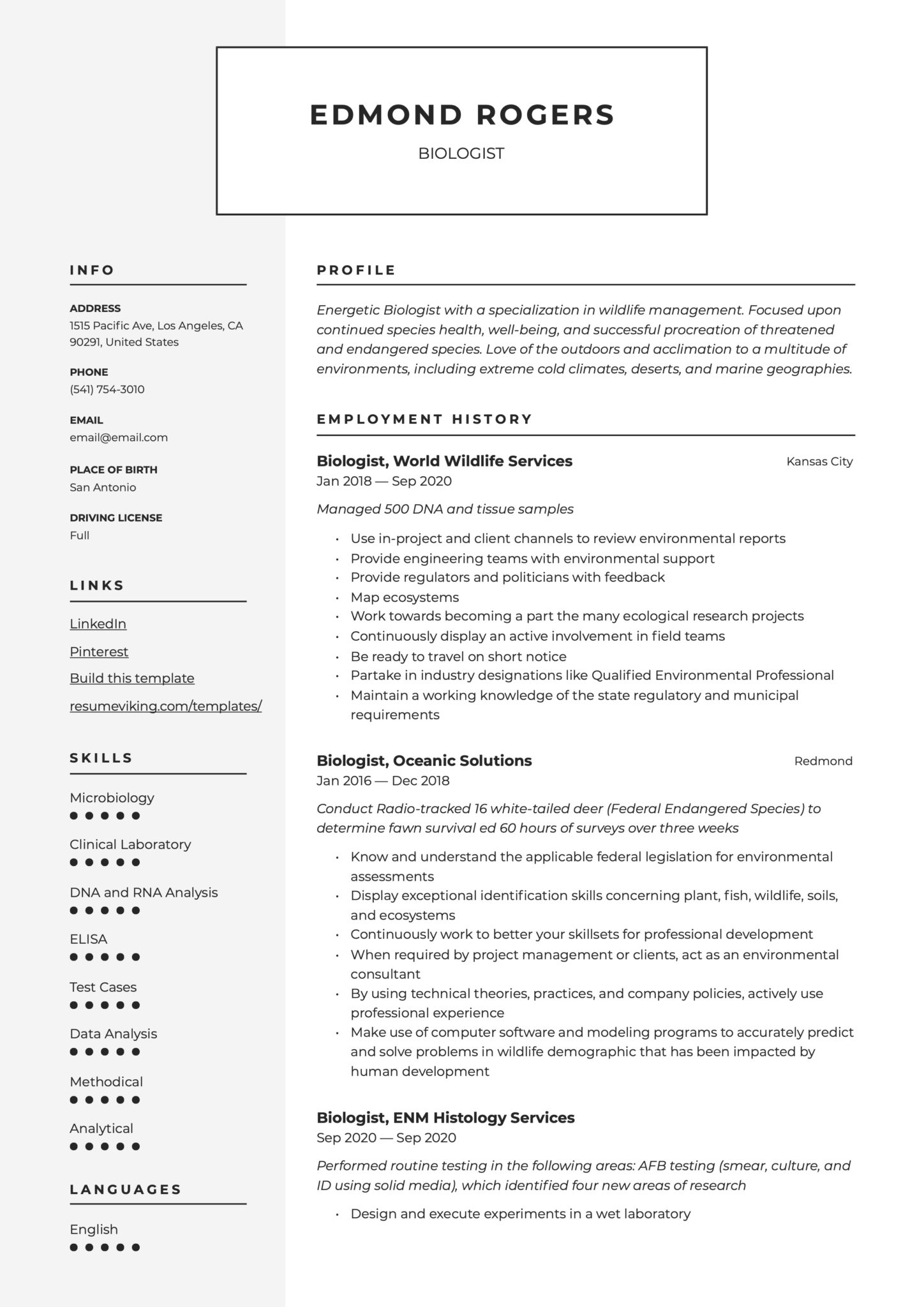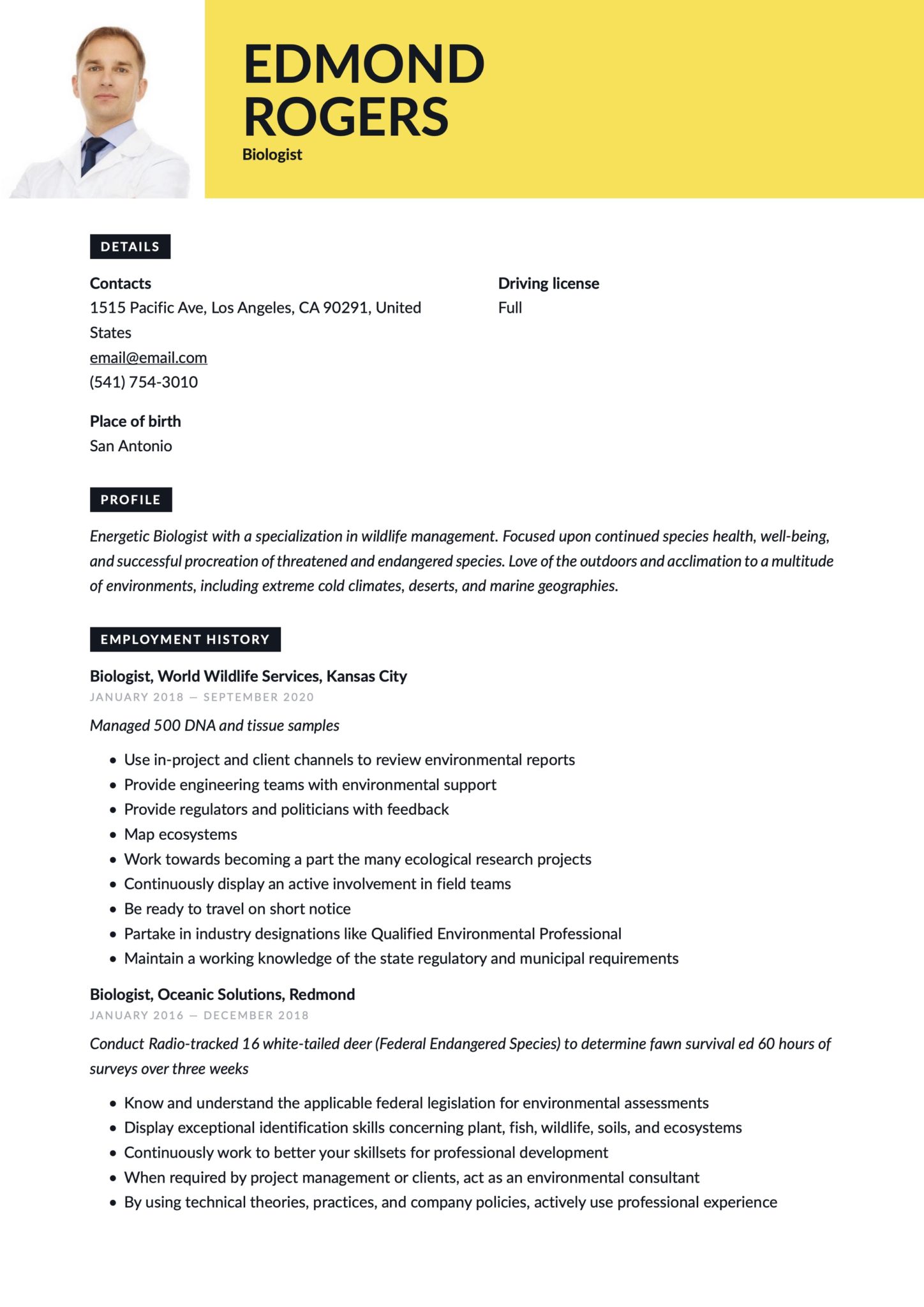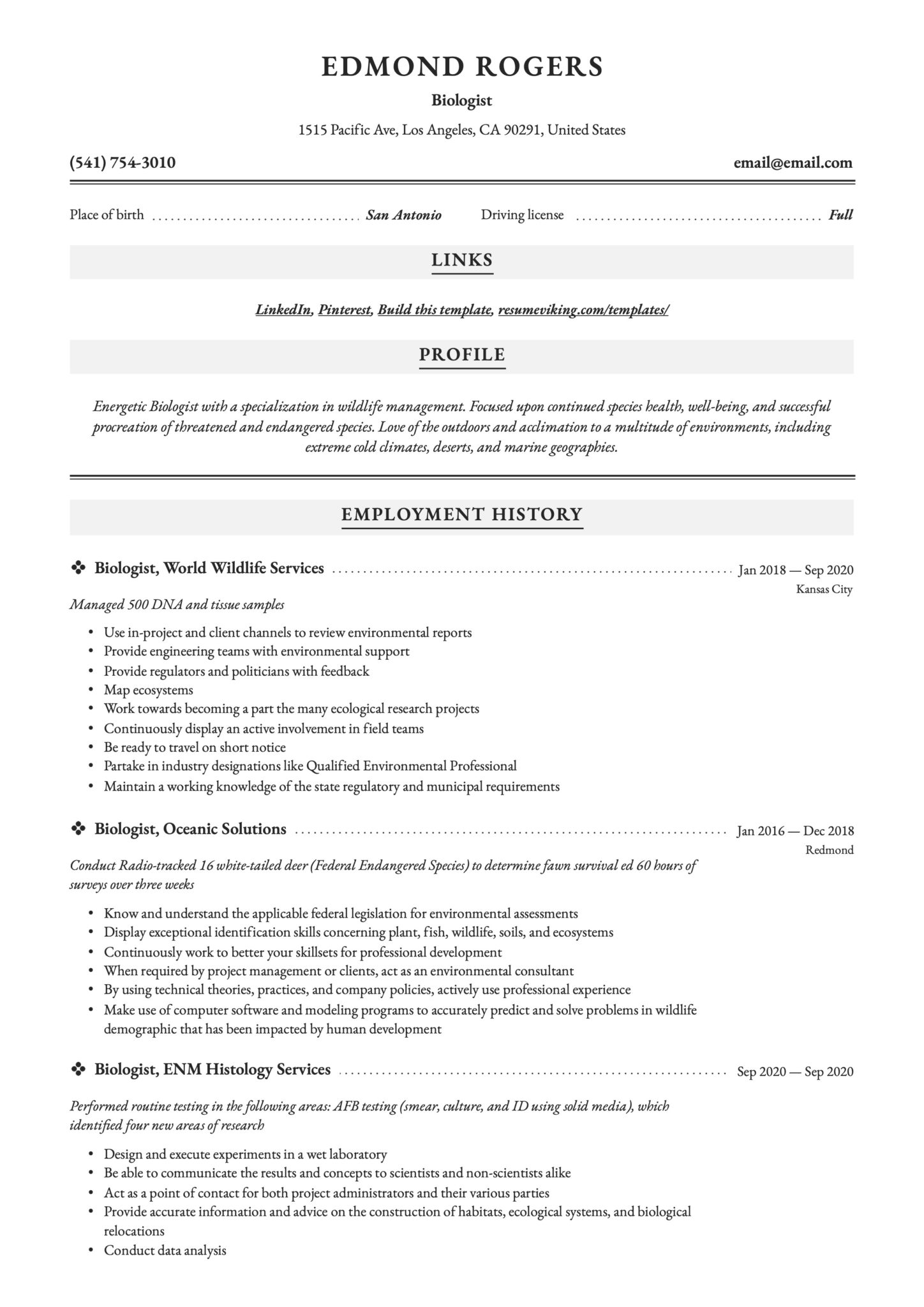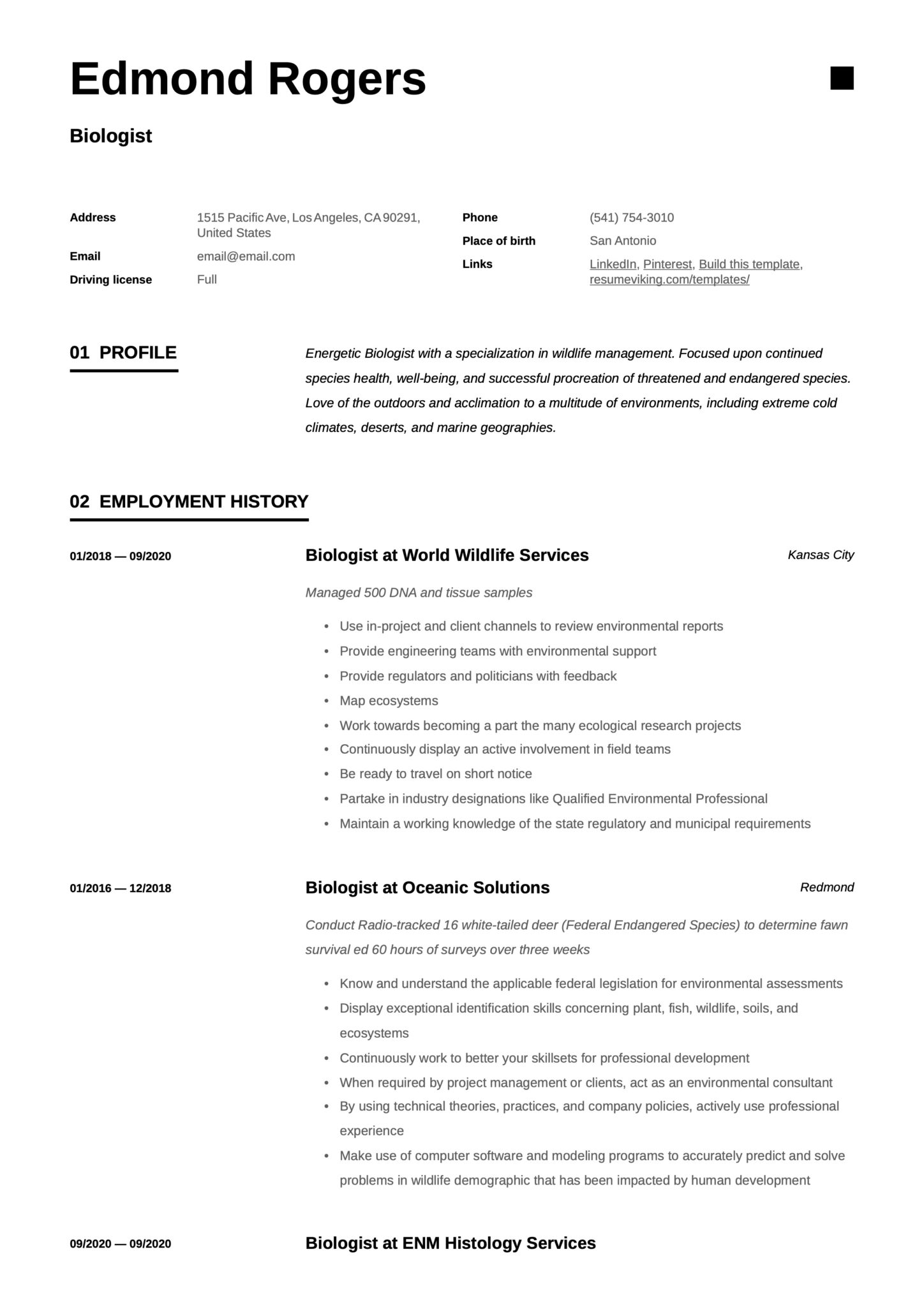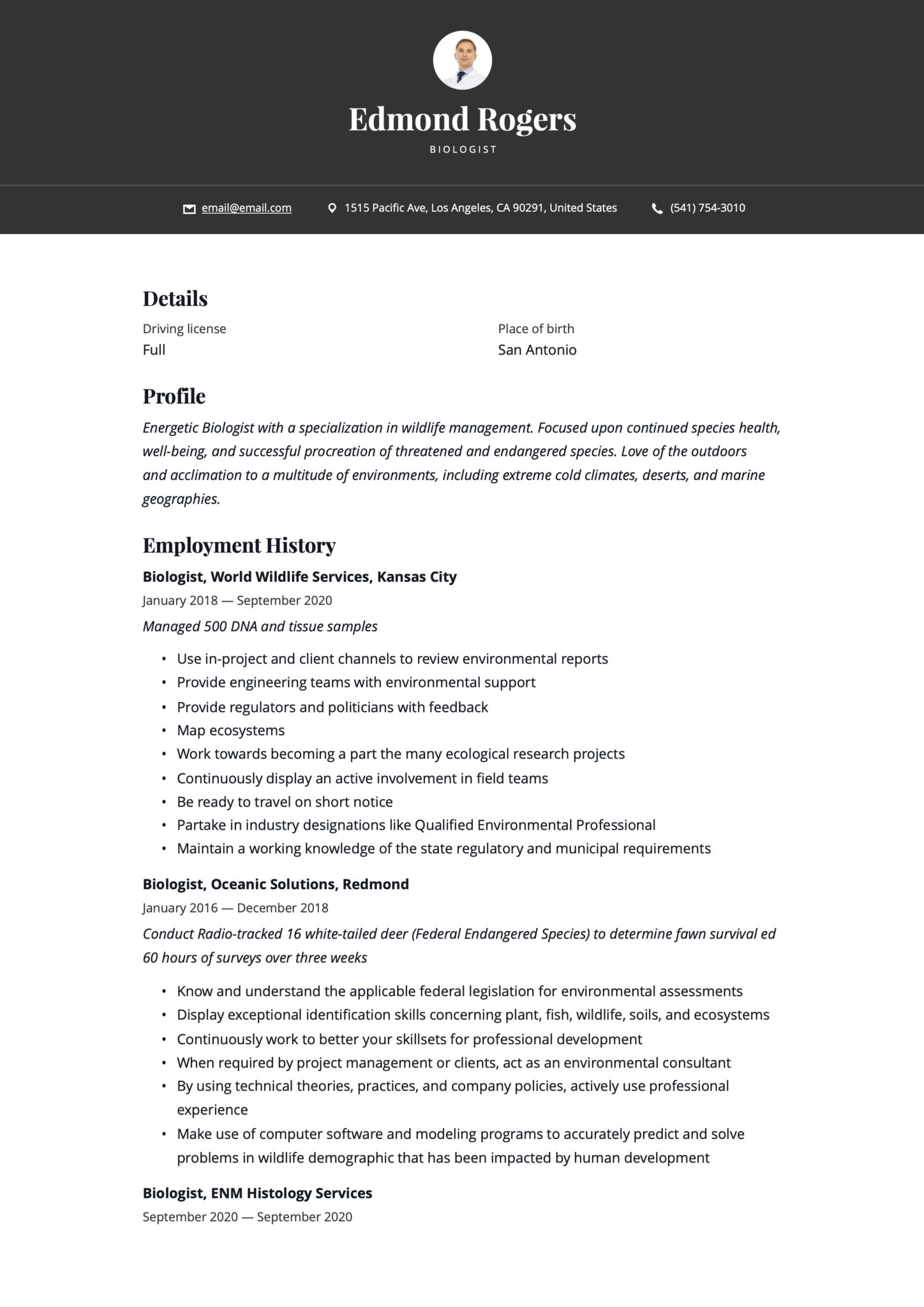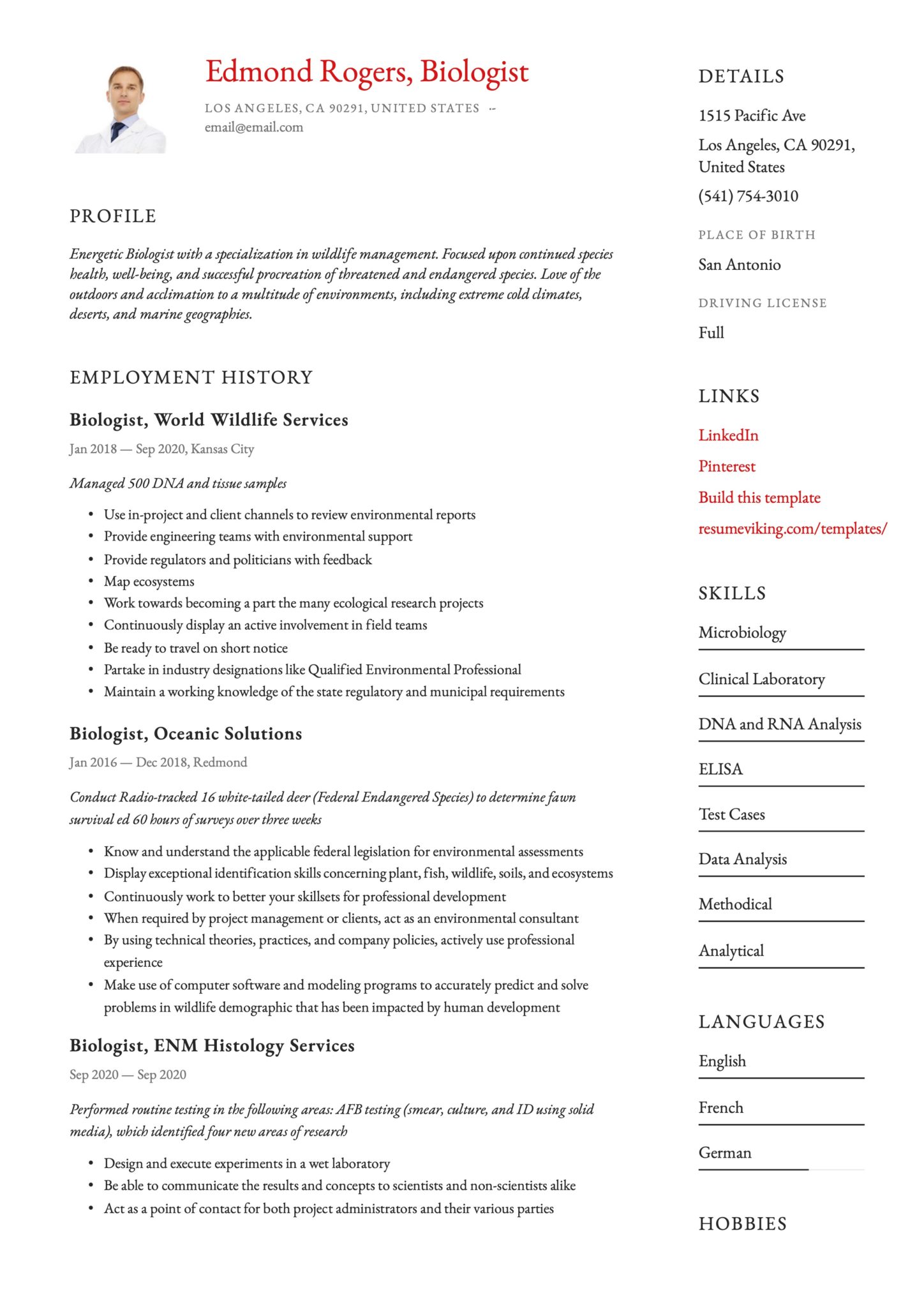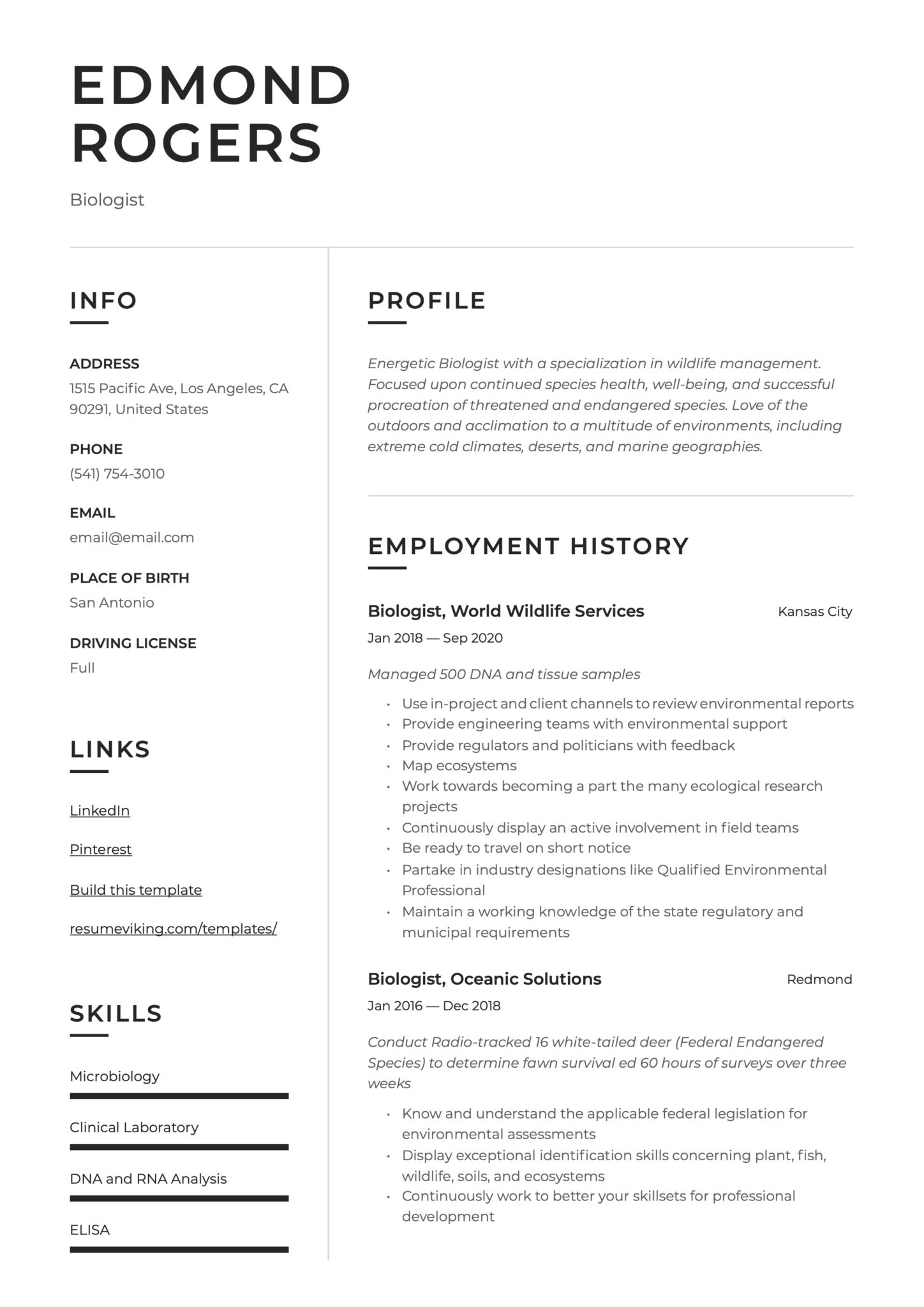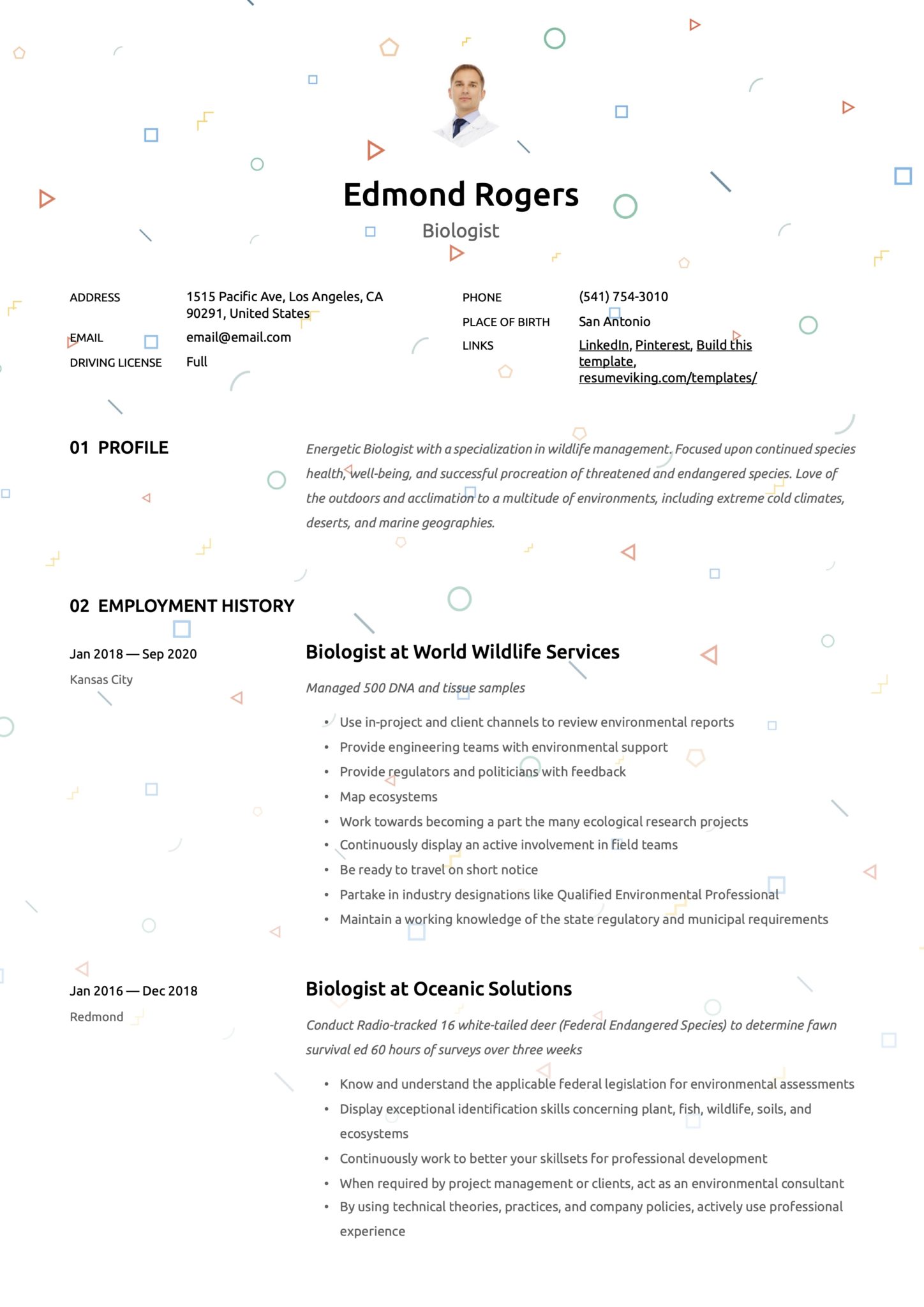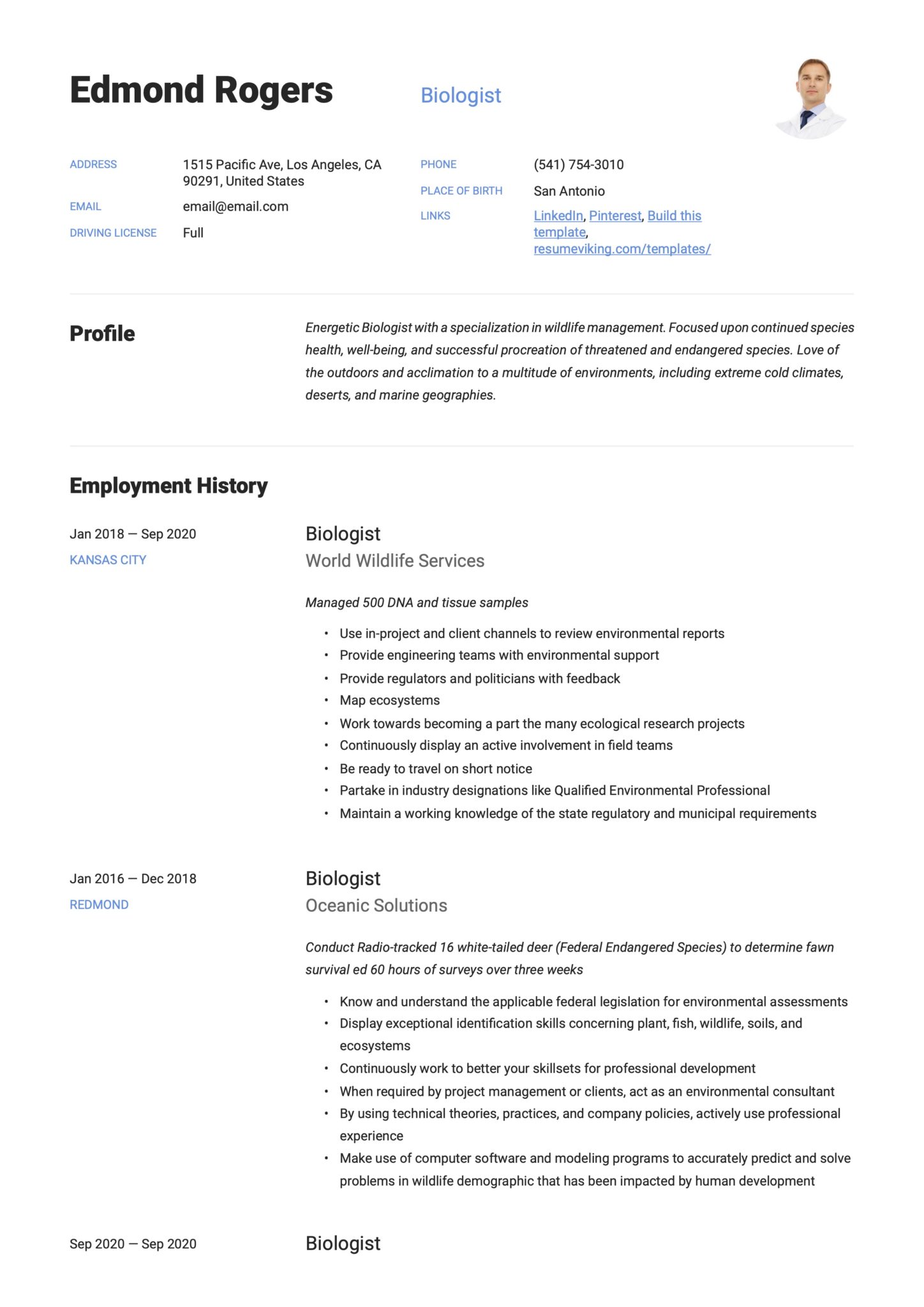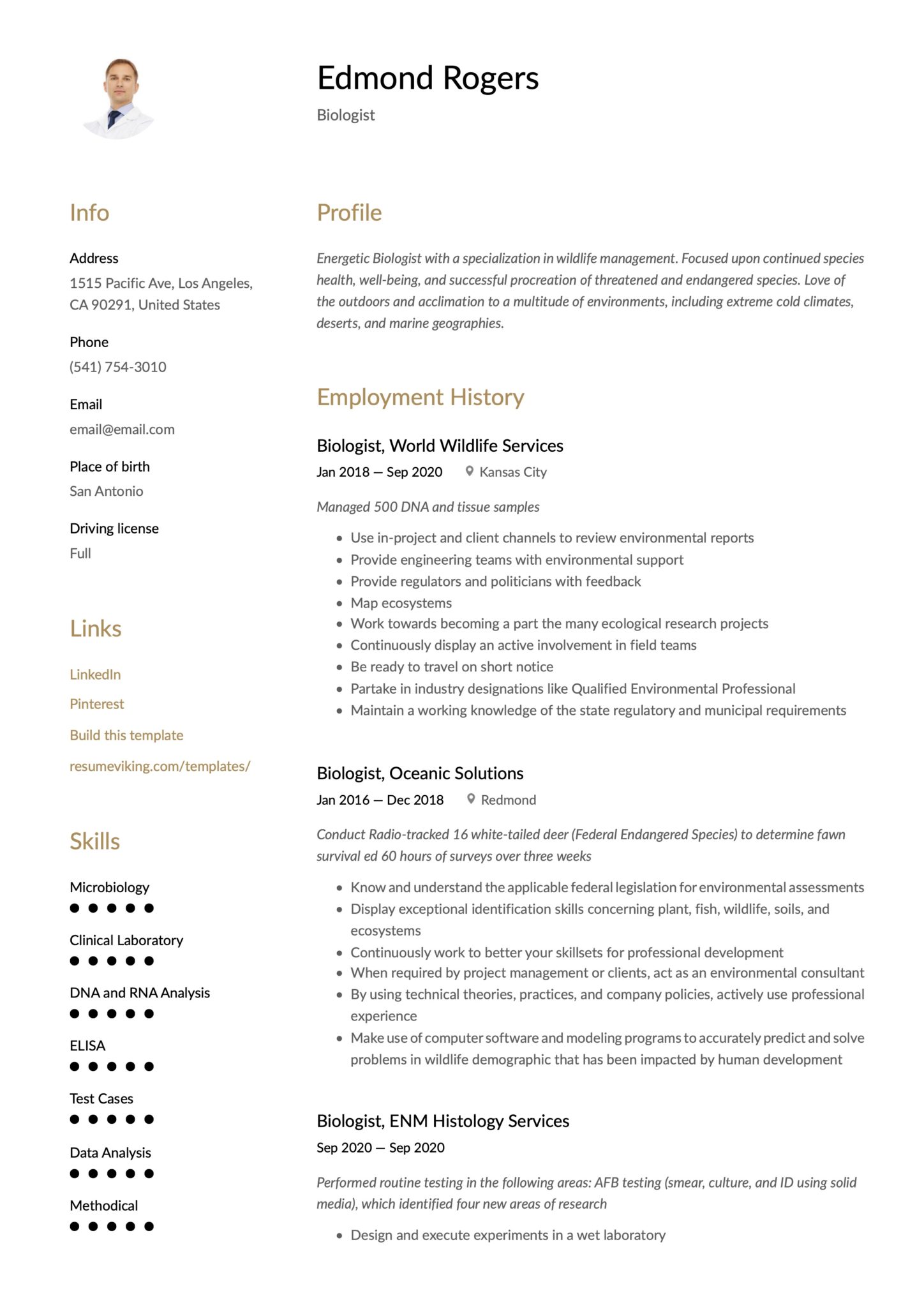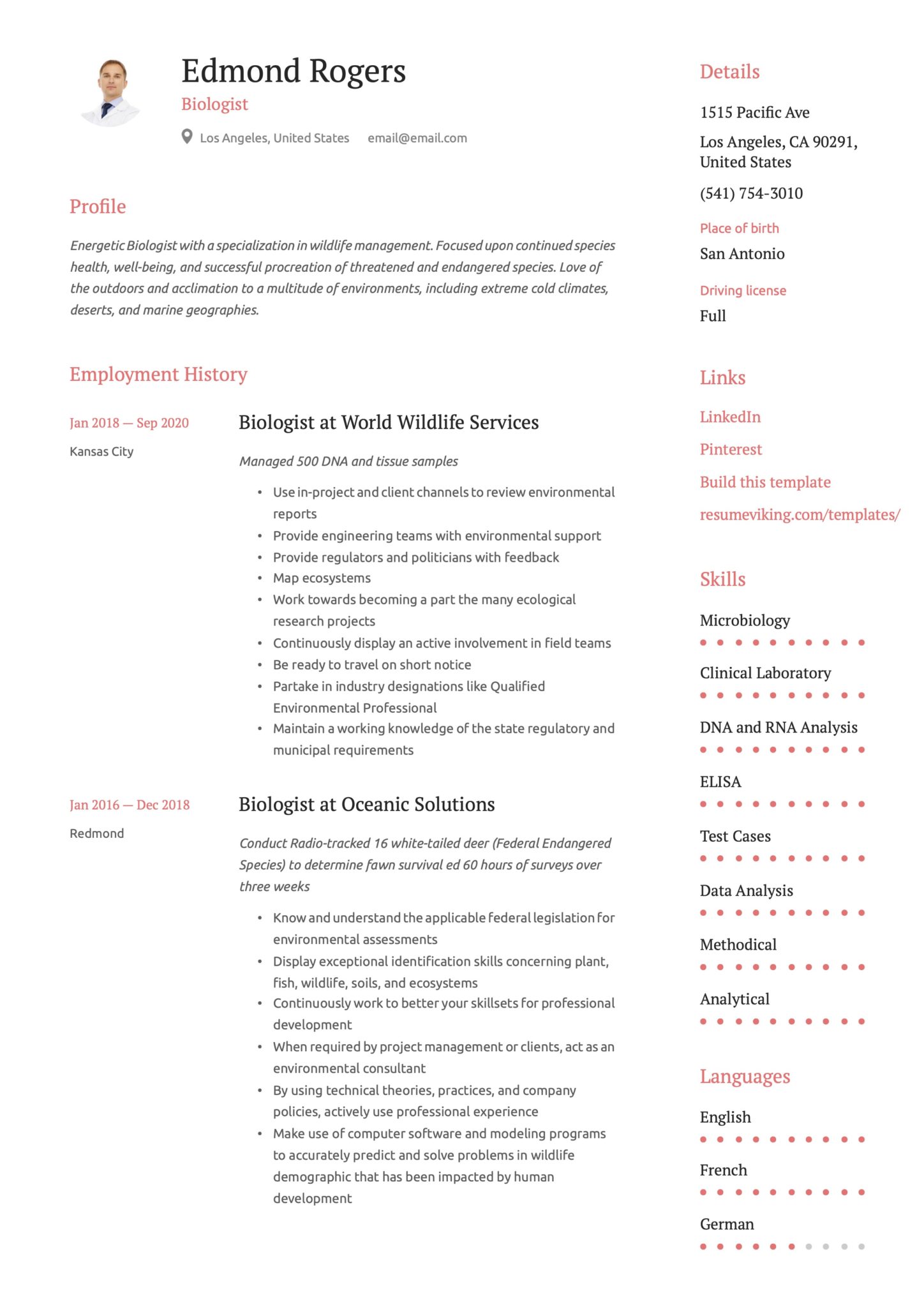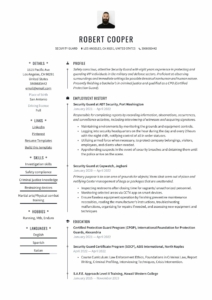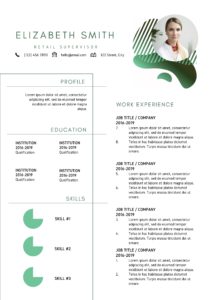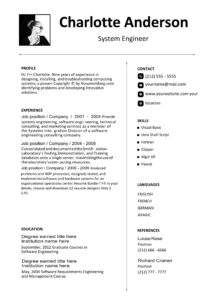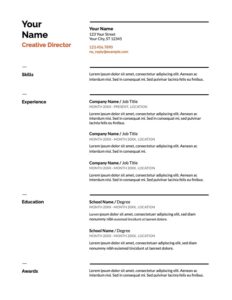Looking for a Biologist position? We consider it then essential too first to consult a few professional and successful Biologist resume examples, before making your own.
To create a stunning resume effectively, we have this resume guide full of samples per resume section, so you will be well-prepared for sending it out and landing your interviews!
It's necessary to keep the content of your resume informative, without making it look like unnecessary “word vomit” on a page. Instead, stand out by keeping your interview-winning resume relevant and well to the point. The blue buttons bring you to a paid resume builder, which you can try for free and is wonderful for crafting stunning resumes, in many designs and with many helping tools.
Let's dive in!
What you can read in this article
17 Biologist Resume Examples
(Free sample downloads are at the bottom of this page)
The Biologist Resume Writing Guide
Resume Sections
1. Contact Information:
- Name
- Address
- Phone Number
Add as well as additional channels through which you can be reached, such as LinkedIn or Facebook. Be sure to add a header with your personal information. To make your name stand out, try using a slightly larger font.
2. Profile Summary:
This summary is where you sell yourself, in a manner of speaking, to your prospective employer, in 1-3 sentences. Your whole life's worth of experience until this moment is what summarizes who you are all your actions and beliefs until this point in time is what defines you. State your relevant experiences and achievements in this section, and tell your future employer why you are perfect for this position. Keep your summary short, but make sure it is impactful. This is your first impression. Make it count.
3. Qualifications Summary:
Here, you brag. State your qualifications and certifications relevant to your job title. Bachelor's or Associates level degrees are often required. Some institutions will, however, need a Master's or Ph.D. Make sure to mention the dates on which you have completed them. Also include qualifications you are currently working on. It is of the utmost importance that the information you provide is accurate and up to date.
4. Relevant Biologist Experience:
To pursue a career in Biology, you are required to have prior experience. Tell your employer about your experience relevant to the job, including your familiarity with various biological and scientific tools and equipment. Also, tell your future employer about your past ten years of working experience and the most noteworthy research to support. Use bullet points to neatly list any job-related achievements you have, such as any research you may have led or supervised to demonstrate leadership skills and make mention of any material you have published or co-published for a little extra razzle-dazzle.
5. Other Employment Experience:
If applying for your first job, you want to give your professional experience the spotlight, front, and center. For this reason, it is advisable to make use of the Chronological format, which is ATS-compliant and a form familiar to most hiring managers. Included in this format is your work experiences and duties that don't directly relate to that of a Biologist, but still include research such as research activities and projects you have conducted during your undergrad studies or mini-dissertations.
6. Skills Summary/Key Skills:
ATS isn't some or other kind of hormone used in ATP synthesis or a DNA sequence. Instead, it refers to an applicant tracking system and algorithm that your potential employers use to weed out all unqualified candidates who do not include the necessary skills for the job in their resume. It's crucial to list your critical skills related to your specific and desired position by incorporating the keywords found in the specific job posting. To pass this dreaded ATS, make mention of your additional skills, too. Scatter these keywords throughout your resume in a natural fashion. Incorporate these into your skills list, also.
7. Education/Licenses/Certifications/Relevant Coursework/Training:
In this section of your resume, list your formal academic qualifications, such as your degrees and accreditations, first. Then go on to list any professional development courses or programs you may have participated in that better prepare you for your position. Of you are still on the junior side, list any professional development courses, workshops, or programs you completed that better prepared you to work in a supportive role such as report writing, research platforms, information databases, data assimilation software, research management tools, and applications.
What to Highlight in a Biologist Resume
A Biologist studies all living things and how they impact their environment and vice versa. These are very complex and diverse, as there are countless processes and organisms to study. Your experience as a Biologist is essential, but there is other information your future employer (most likely a highly acclaimed scientist or Biologist themselves) will need to know about you to ensure that you are a good fit for the position in question.
First and foremost, it is crucial to address the setting in which you work. For a Biologist, there is a broad spectrum of options available in terms of employment. As a Biologist, you have an arsenal of options available to you, but you need to remember that recruiters may not understand your industry. So be as clear as possible regarding your role type and description.
- Government: As a Biologist, you will most likely get a job working for the government. Biologists specializing in a field such as epidemiology can get a job working for organizations such as the CDC or healthcare research. USAMRIID is another option to pursue. As far as government work goes, you might also look at the EPA or take on research advisory roles in state environmental protection bodies.
- Education: For a Biology graduate, teaching is also an alluring option to pursue. There is a shortage of biology graduates, and it is also a STEM subject. Therefore you will always have employment opportunities available to you, especially in research positions in government and universities. Teaching is also an attractive choice for many biology graduates.
- Law Enforcement: They also make use of Biologists in forensics. They examine evidence and analyze crime scenes.
- Private Sector: If you're more interested in the private industry, Biologists can look into labs doing disease research and treatment using botany. You can also consider into researching herbicides and pesticides for agricultural development. Other options also include biotechnology, research in genetic modification, and the future of agritech.
Secondly, Biology is so vast that no one Biologist can be an expert in all fields. Most Biologists choose, therefore, to specialize in one biological field and dedicate their academic career to that one field. Hiring Managers would look for specific keywords and jargon regarding your field of specialization. Let's consider a few choices and look at the most important keywords and phrases to use when compiling your resume:
- Anatomy: Explain to the ready whether you are involved in human, animal, or plant anatomy work. The study of human anatomy focuses on the structures of the human body and studies the way that these internal parts interact with one another to form a functional unit. Studying the anatomy of animals focusses on the various structures of the animal body to differentiate between what is expected and what is abnormal. Plant anatomy focuses on the internal structures and processes found in plants, mostly on a cellular level.
- Morphology: If this is you, Lab Managers will look for terms such as the study of the macroscopic structures of plants to the microscopic or molecular level.
- Histology: Think everything tissue related. Research directors would want to know what your level of experience is in preparing tissue samples for examination under a microscope.
- Ecology: Ecologists study the relationship between living organisms and their environment. They also study the consequences these relationships have on the environment. This field often involves teaching and education aspects to, so be sure to mention if you are comfortable with educating on a community or school level.
- Physiology: This field of study has led to breakthroughs in biological sciences, and keywords to add to your job descriptions include: animal-, plant-, cellular-, and microbial physiology. organs, organisms, systems, cells, and biomolecules.
- Cytology: Cytology is the study of the structure, function, and composition of cells. Due to its importance in the diagnosis and treatment of diseases and conditions, cytology is seen as a part of the field of pathology. You would probably be working for a pharmaceutical or disease control center. Industry buzzwords that readers would search for on your resume include: urine, blood, and spinal fluid.
- Embryology: Embryologists can either work with doctors in cases of reproductive health in patients or a clinical research environment. Clinical embryologists retrieve and run tests on eggs and are key role players in in-vitro fertilization. If they choose to, embryologists can further their careers as fertility researchers, andrologists, senior embryologists, or even become professors. Regardless, the onus is you to ensure that the purpose of your position is clearly emphasized in your resume content.
- Genetics: Geneticist, as indicated by the name, focuses on the genes, or DNA, found in organisms. Recruiters would be considering your contributions in the evaluation, diagnosis, management, and treatment of patients with genetic issues. They would also expect to see information about patient counseling and your contributions to international publications and journals in your resume document.
Next to address is your administrative functions. A Biologist is often tasked with duties similar to that of an executive assistant but in a research setting. These duties include administrative tasks such as organizing fundraisers, preparing and proofreading reports, or manuscripts for their professors or printing proposals. They also often get tasked with cleaning lab equipment, taking minutes in meetings, or being stakeholders.
Finally, Biologists need to be literate in various technologies, tools, and software to fill their jobs.
- If you are planning on conducting exploratory or investigative activities, you would need to know how to use various search engines other than google. Some other search engines include ContentMine, Biohunger, Mendeley, DeepDyve, BibSonomy, ReadCube CiteULike, and ScizzlFor
- To speed up your research process, you will need to know how to use article visualization tools to help you navigate multiple platforms at in your resume; it would be wise to mention your competency in applications like Colwiz, Pegasus, Ovation, PaperHive, PubReader, and Bookshelf.
- As a researcher and Biologist, activities such as coding and programming are essential skills to have. Some of the software applications your future employer will be looking for on your resume include: Matlab, SQL, R, Python, and SPSS
Biologist Resume Summary
Professors at universities and the directors at research institutes tend to be the hiring decision-makers for Biology positions. Biology is such a high-stakes field, and potential employers want the best of the best. Therefore your resume will have a mere 6 seconds to make a good impression. Your career summary should be short and sweet. Keep the content detailed and to the point. Write the most relevant information first to get their attention while they scan your resume.
Start the summary with the most relevant experiences in biology and the duties you performed. Use the keywords you find in the job description, as mentioned previously, to guide how you write your summary. These words are how you will look more suited for the job in question to the hiring manager.
The next important thing is to add a line that showcases how outstanding you are; tell your employer about your best qualities and how you will add value to the company.
End your summary with your educational background. List your degrees, diplomas courses, or professional memberships that relate to the job at hand.
Examples of Biologist Career Summaries:
Profile Summary Example 1
"Highly dedicated and knowledgeable Entry Level Biologist with an exceptionally broad and deep botanical and biochemical background. An adept and thorough researcher with a meticulous and rigorous approach to experiment accuracy and verification. Able to explain complex biochemical and microbiological concepts to both lay and professional audiences clearly and accessible manner."
Profile Summary Example 1
"A dedicated biological researcher with more than four years of experience using molecular biology techniques, including sample preparation and sequencing. Looking to leverage mastery of biolyzers and electron microscopes in biological research at Qyl Inc."
Profile Summary Example 1
"Energetic Biologist with a specialization in wildlife management. Focused upon continued species health, well-being, and successful procreation of threatened and endangered species. Love of the outdoors and acclimation to a multitude of environments, including extreme cold climates, deserts, and marine geographies."
Biologist Job Descriptions, Responsibilities and Duties
A Biologist will typically provide operational and administrative support to Professors, Research Managers, and Scientific Directors in their respective fields. You should include your experience in tasks such as overseeing experiments, updating records, implementing testing methods, handling samples, and supervising technicians. A Biologist with a Master's degree will have chosen a specialty in some or other area animal or plant species and habitat. The diversity of life on our planet is so vast that every Biologist's job is so to say, unique. Still, every Biologist should be able to fulfill the following tasks:
Examples
A Biologist Job Description:
- By making use of in-project and client channels, environmental review reports
- Provide engineering teams with environmental support
- Provide regulators and politicians with feedback
- Map ecosystems
- Work towards becoming a part the many ecological research projects
- Continuously display an active involvement in field teams
- Be ready to travel on short notice
- Partake in industry designations like Qualified Environmental Professional
- Maintain a working knowledge of the state regulatory and municipal requirements
- Know and understand the applicable federal legislation for environmental assessments
- Display exceptional identification skills concerning plant, fish, wildlife, soils, and ecosystems
- Continuously work to better your skillsets for professional development
- when required by project management or clients, act as an environmental consultant
- By using technical theories, practices, and company policies, actively use professional experience
- Make use of computer software and modeling programs to accurately predict and solve problems in wildlife demographic that has been impacted by human development
- Be fluent in chemistry, and it's applications in biological contexts
- Show competence in mathematics, physics, and management strategy
- Design and execute experiments in a wet laboratory
- Be able to communicate the results and concepts to scientists and non-scientists alike
- Act as a point of contact for both project administrators and their various parties
- Provide accurate information and advice on the construction of habitats, ecological systems, and biological relocations
- Conduct data analysis
- Assist students in finding the relevant information they need for their projects by utilizing the databases
- Foster a closely-knit working relationship with college faculties to have the proper research resources available for specific projects.
- Aid students with researching local employers and making contact with human resources professionals
- Responsible for the maintenance of the research library
Highlight Your Accomplishments
Resist that strong pull tempting you to copy and paste the list of duties you have stated under your accomplishments. This will not help you stand out from the other applicants.
Instead, list the awards you have received, seminars you have attended in the industry, and any other achievements that haven't been listed elsewhere that you find relevant.
Remember to keep the content relevant to the specific job you are applying for. No one cares about your gold medal in gymnastics, can read astrology birth charts, or that trophy you won at a fishing tournament. If the reader perceives the content added in this section as true accomplishments, it'll add value to your resume.
What sets you apart from everyone else? What are you most proud of? Communicate these using action-packed statements to grab the attention of the hiring manager. The relevant achievements and awards to this position are more valuable than a high GPA, significantly, if you can add a number to your achievement. For example:
- Managed 500 DNA and tissue samples,
- Exceeded performance by achieving <1% of OOS related to laboratory error.
- Performed routine testing in the following areas: AFB testing (smear, culture, and ID using solid media), which identified four new areas of research
- Conduct Radio-tracked 16 white-tailed deer (Federal Endangered Species) to determine fawn survival ed 60 hours of surveys over three weeks
Biologist Education Section
To a hiring manager, your academic tenure is essential. In this section of your resume, provide detailed and sufficient information to the reader compiling the shortlist. Shortly indicate What, Where, and When regarding your academic qualifications, certifications, or obtained industry licenses. Simply state the name of your qualification, the institution you received it from, and the date on which you completed the qualification. Feel free to include the major subjects or course curriculum topics if you have an associate's or bachelor's degree.
Examples
2020 – Master of Science in Biology, University of Colorado Denver Colorado
2013 – 2017 Bachelor of Science in Chemistry, University of Nevada, Reno Nevada
Course Curriculum: Physics, Biochemistry, Calculus, Chemistry, Computer Science, Engineering Physics, Geometry
2012 Certification in Molecular Pathology, University of Minnesota Moorhead, MN
2011 Chemistry and Microbiology Laboratory Certification, Harvard University, Boston, MA
Biologist Resume Skills
Along with the technical skills required in the field of biology, soft skills are also taken into consideration. Soft skills refer to the personality traits or abilities that indicate to the hiring manager that you are a good fit as a Biologist. Take care to incorporate these into your summary, or profile, and into your accomplishments. Here, you focus on the biology skills that make you a well-above-average research assistant. It is essential to get this right:
Make one master list of all the job skills you have, in other words, both the soft skills and hard skills, technical skills, and any skills you've got hidden in your lab coat pocket.
Go through the list and choose those skills best suited for the job. Use that job ad as a good guideline, and use these in your interview-winning resume. Mention skills that your education and past experiences can prove.
Technical Skills Examples
| Lab Equipment | FDA Mutagenesis | Microdissection |
| Microbiology | Data Entry | Behavioral Assays |
| Clinical Laboratory | DNA and RNA Analysis | Dissection |
| Vitek | Grant and Proposal Writing | Microsoft Office |
| Salmonella | Immunocytochemistry | Light and Electron Microscopy |
| Test Cases | ELISA | Scientific Modeling |
| Gram Stains | Fluorescent Microscopy | Data Analysis |
| Microbial limits | Stereotaxic | Molecular Cloning |
| Restriction analysis | Spectrophotometry | Mathematical Probability Theory |
Soft Skills Examples
| Active Listening | Reading Comprehension | Problem-Solving |
| Initiative | Integrity | Critical Thinking |
| Empathy | Detail Orientated | Writing |
| Self-control | Troubleshooting | Speaking |
| Deadline driven | Accurate | Judgment |
| Hard-working | Methodical | Decision Making |
| Persistence | Analytical | Coordination |
| Meticulous | Time Management | Social Perceptiveness |
| Task-driven | Organizational | Technical Thinking |
| Dedicated | Interpersonal | Process Oriented |
| Realistic | Conscientious | Deadline Driven |
Qualifications/Certifications associated with Biologists
| Various Bachelor of Science Disciplines | Wetland Professional in Training | Masters Degree – Various Scientific Disciplines |
| American Society for Clinical Pathology certification | Clinical Molecular Genetics Certification | Ph.D. – Various Scientific Disciplines |
| Certified Environmental Scientist-National - Registry of Environmental Professionals | Clinical Cytogenetics and Genomics Certification | Clinical Biochemical Genetics Certification |
| Board Certified Entomologist-Entomological Society of America | Professional Wetland Scientist | AAB - Board of Registry |
Professional Information for Biologists
Sectors: Professional, Technical Services, Education Services
Career Type: Research, Statistics, Testing, Sampling, Mathematical Modeling Administration, Information Coordination, Data Analysis, Report Writing, Presentations, Data Collection
Person type: Researcher, Fieldworker, Lab Worker, Scientist, Interviewer
Education levels: Associate's Degree, Bachelors' Degree, Master's Degree, Doctorate Degree
Salary indication: An average of $80 537 depending on the position scope and industry (Indeed)
Labor market: Estimated 4% growth between 2019 – 2029 (BLS)
Organizations: Universities, Colleges, Research Institutions, Medical Centres, Law Firms, Publishing Companies, Government, Non-Profit
Download Biologist Templates in PDF
